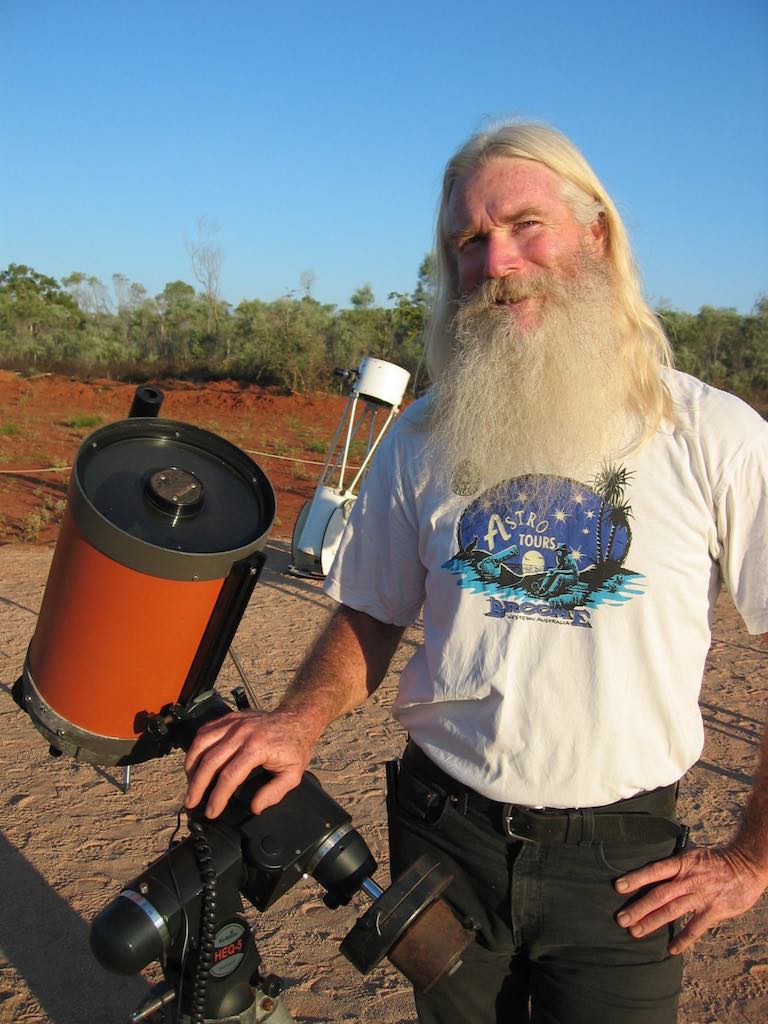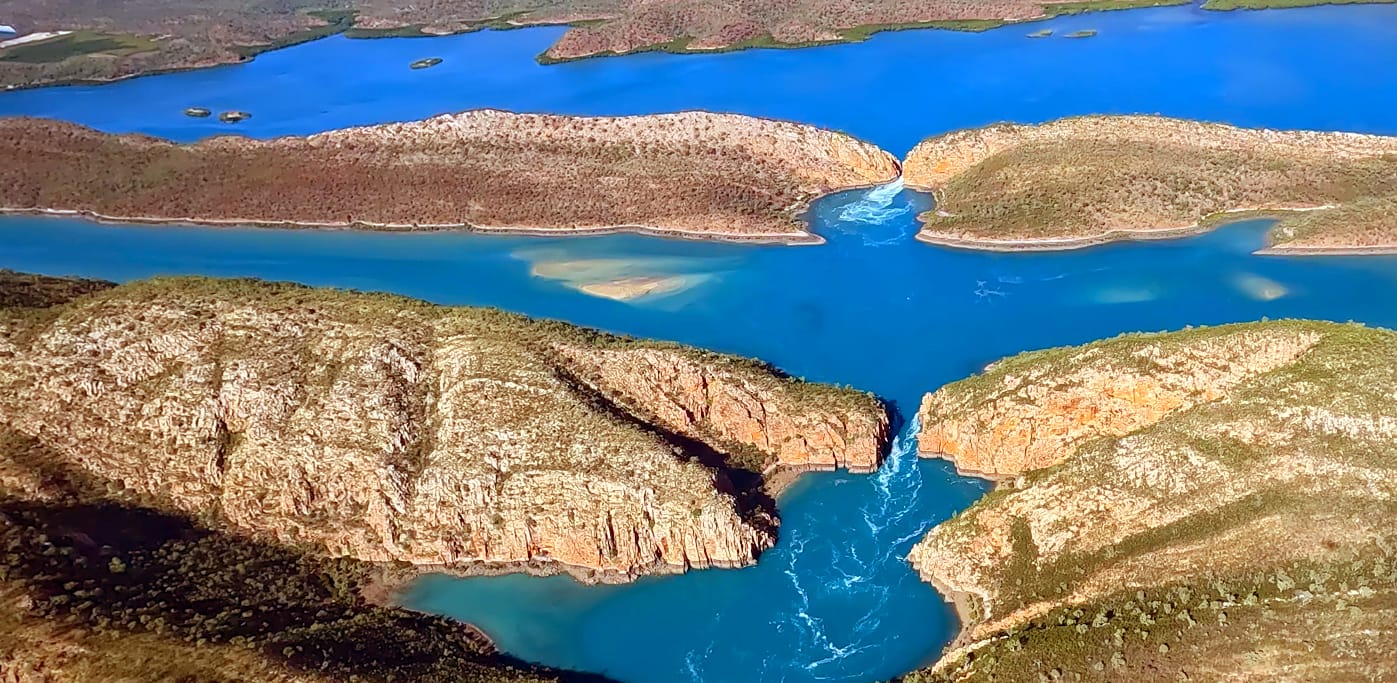Greg Quicke’s interest in the cosmos was drawn like a tide pulled by the moon.
And it’s turned him into an international media star.
Up in the Kimberley with its world-famous king tides, Greg’s earlier life as a pearl diver was dictated by the gravitational draw of the moon.
“You can only dive for pearls on the smaller tides. The people who work and live here intensely follow the cycles of the moon,” says Greg.
But that was many moons ago.
With time, Greg has armed himself with an expert’s knowledge of the moon, the sun, the stars, the planets and the universe.
For 22 years from a farmer’s patch of property on Broome’s outskirts, Greg has been leading community stargazing.
When a couple of British television producers turned-up among a crowd of tourists, they liked what they saw and heard and reported back to London on a new discovery: Greg Quicke.
The heavens opened with a way for Greg to spread his words on the wonders outside our world to a massively-enhanced international television audience.
At 56, Greg is co-presenter, with Britain’s internationally-famous British scientist Brian Cox, of the BBC/ABC popular program, Stargazing Live.
The program has brought vast, new audiences to astrology.
The first series was a huge hit in Britain and Australia with Greg’s long silver beard and hair evoking the image of a worldy-wise wizard.
The amateur expert and the eminent scientist made a powerful team.
When the two were in NSW, Greg located a microscope to show Professor Cox a part of the universe he’d never seen and the two clicked over their mutual passion.
Greg was quickly signed for another series of Stargazing Live.
These days the boy who set out early from Bridgetown in search of adventure – and found it in a number of fields – carries out community, corporate and school talks between filming assignments.
To see Broome’s unlikely shining star in action, I join 48 mums, dads and kids in Greg’s patch of earth, 20 minutes north of the town.
At the end of a sandy track, through a gate kept closed to keep-in the farm owner’s cattle, Greg is set for the crowds that come three or four times a week to hear from words of wisdom from the wizard.
Eight telescopes and binoculars set on tripods are arranged in front of 50 red camping chairs set in a semi-circle.
Small red lights are strung along a presenter’s patch. (White light seriously impedes night-time viewing and is never used).
Greg’s set-up has been assisted by a couple of volunteer American scientists including an astrophysicist who have come for a few months to watch and learn.
Broome’s 300 cloudless nights a year with clear viewing of both northern and southern hemispheres makes for a stargazing hotspot.
At 6pm precisely as darkness is about to fall Greg begins to explain what’s happening above us as and planets and stars light up and sparkle.
“In the tropics here we are lucky. Darkness comes quickly. Then it takes about 20 minutes for our eyes to fully adapt,” says Greg.
And he’s had plenty of night-time experience, having spent large chunks of his life sleeping in a swag under the stars when working as a mechanic on Top End and Kimberley cattle stations.
Greg’s two-hour talk is entertaining and fascinating.
It’s no lecture.
“It’s an adult presentation unless it’s a school group. I tell parents they’re welcome to bring children if they think they won’t get bored,” he says.
Hardly. All the kids in our session are riveted, brimming with questions and eager to take turns at the telescopes ranging in sizes from 8in to 16in in diameter.
“Have you seen Jupiter yet?” Greg asks.
“Jupiter has 69 moons but we only see a few of them.”
Greg pulls out a powerful laser torch and points to the stars and planets.
As if on cue, the long tail of a bright falling star streaks across the sky.
“It’s actually a meteorite,” quips Greg.
During the talk, the American astrophysicist calls out something.
Greg directs our eyes west to bobbing, moving lights.
“It’s the international space station with some men and probably women on board,” he says.
Greg tells us plenty: the moon is actually black (we see it white only because of the sun’s reflection) and that in six months from now the earth, moving at break-neck speed, will be hundreds of thousands of kilometres away and half-way around the sun.
He points to where the planets and major stars are and where to find the zodiac clusters.
Like many scientists, Greg isn’t a church-goer but acknowledges “an order, an intelligence out there”.

Greg’s brochure reads: “In the time it takes you to read this, our entire solar system will have travelled 7,000 kms through space on its way around the Milky Way galaxy. Are you having fun yet?”
It’s a tone that reflects his talks and his approach to life and beyond.
Greg tells his audience that despite 400 years of knowing the earth is round, mankind still has a flat-earth mentality.
“We still say the sun is going down or coming up but what is happening is that earth is turning away from the sun. But there’s no short way to say that!”
Greg says we’d be better off consciously recognising earth’s place in the big scheme of things and what is happening in space.
He bemoans bright lights in urban areas interfering with what could be seen by everyone at night as part of our education and understanding.
“All the world’s lights should be pointing down to the ground instead of being wasted. It would save about a third of our precious energy,” he says.
Greg, whose Astro Tours has neem delivering “intensely-practical astronomy to humanity since 1995”, warns his audience that stargazing can be infectious.
He’s right about that.




































